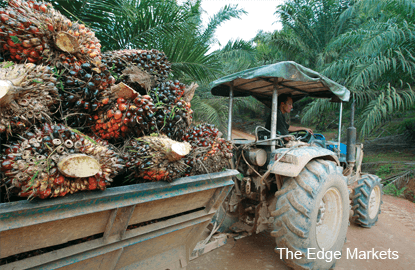
EARLIER this month, the Council of Palm Oil Producer Countries (CPOPC) took a step forward with the appointment of Benny Wachjudi as its first executive director. He then signed a Host Country Agreement between CPOPC and the Indonesian government, paving the way for the CPOPC secretariat to become operational.
While this barely made the news locally, CPOPC apparently has big plans to regulate international palm oil production, control palm oil prices and strengthen the bargaining position of Malaysia and Indonesia, which collectively contribute 85% to the global palm oil supply.
“It (CPOPC) will operate much like a cartel, much like Opec (Organization of the Petroleum Exporting Countries),” an executive at a large plantation company quips — cartels do not abide by World Trade Organization rules.
While it only involves Malaysia and Indonesia at present, CPOPC hopes to eventually include all oil-palm cultivating countries, including Uganda, Nigeria, Liberia, Ghana, Brazil, Colombia, Thailand, Papua New Guinea and the Philippines.
CPOPC also hopes to control and regulate crude palm oil (CPO) production. It also hopes to be an alternative to the Europe-based Roundtable on Sustainable Palm Oil (RSPO), established in 2004 to promote the growth and use of sustainable palm oil.
“The CPOPC’s aim is to control supply, which will ensure the price of CPO does not fall to low levels,” says the executive with a large plantation group.
CPO prices fell 48% from RM3,589 per tonne in April 2012 to multi-year lows of RM1,867 per tonne in August last year. While prices have since rebounded to the RM2,600 per tonne band, and plantation companies’ prospects have improved, there have been some issues with RSPO.
In April, IOI Corp Bhd’s RSPO certification was suspended because of a breach of the roundtable’s principles by the planter’s Indonesian units — PT Sukses Karya Sawit, PT Berkat Nabati Sawit and PT Bumi Sawit Sejahtera.
A month later, in May, Felda Global Ventures Holdings Bhd requested a withdrawal of the RSPO certification of 58 of its mills.
Considering its importance, a surprising number of executives with local plantation companies seem unaware of what is taking place and do not see how CPOPC will work.
“There has to be some political will to push CPOPC through. There is a lot of competition between us and the Indonesians and this has to be overcome first,” says another plantation company executive.
One example is the plan by Indonesia to set up green economic zones to develop CPO derivative products, which would compete directly with the Sabah government’s palm oil industrial clusters in Lahad Datu, built in 2005, to spearhead the development of downstream palm oil processing.
A plantation analyst says the CPOPC has yet to take effect, although it was established in November last year.
“The Indonesians are still throwing [CPO] prices, so we, Indonesians and Malaysians, are clearly not working together,” he says.
Others feel the CPOPC may have been rushed through during the Asean summit in November 2015, and more thought should have been put into it before it was set up.
Malaysia, the world’s second largest CPO producer, and Indonesia, the largest, signed the Charter of the Establishment of the CPOPC on the sidelines of the 27th Asean Summit in Indonesia November last year, in the presence of Malaysian Prime Minister Datuk Seri Najib Razak and Indonesian President Joko Widodo. Both countries contributed an initial sum of US$5 million for CPOPC’s operations.
Another industry official questions why the CPOPC, or a similar body, was not started earlier.
“When you collectively control 85% of the CPO market, you should work together ... it is not rocket science. CPO makes up something like 35% of the global edible oil market, so CPOPC is up against other edible oils, and it is a tough fight. Almost the entire edible oil community says CPO is unhealthy, and we should have addressed this negative perception much earlier,” he says.
He questions whether the CPOPC’s plan to be an alternative to the RSPO will even work.
“It’s not like they (the European importers) have no other alternative but to use CPO,” he says.
While CPOPC may not have started off on the right foot, it is still early days.
In January this year, France passed a bill to impose progressive palm oil import taxes from €300 (RM1,361) per tonne in 2017 to €500 in 2018, €700 in 2019 and up to €900 per tonne.
However, following intense lobbying by the Malaysian and Indonesian authorities, the tax will now start at €30 in 2017 and rise by €20 per year to €90 in 2020, well below the original proposal.
Then, there is also the labelling of products as containing palm oil as opposed to edible oil — a damaging requirement as it implies palm oil is inferior to other edible oils.
Save by subscribing to us for your print and/or digital copy.
P/S: The Edge is also available on Apple's AppStore and Androids' Google Play.